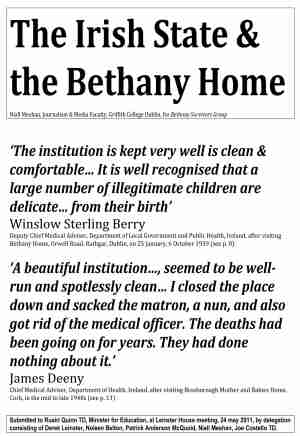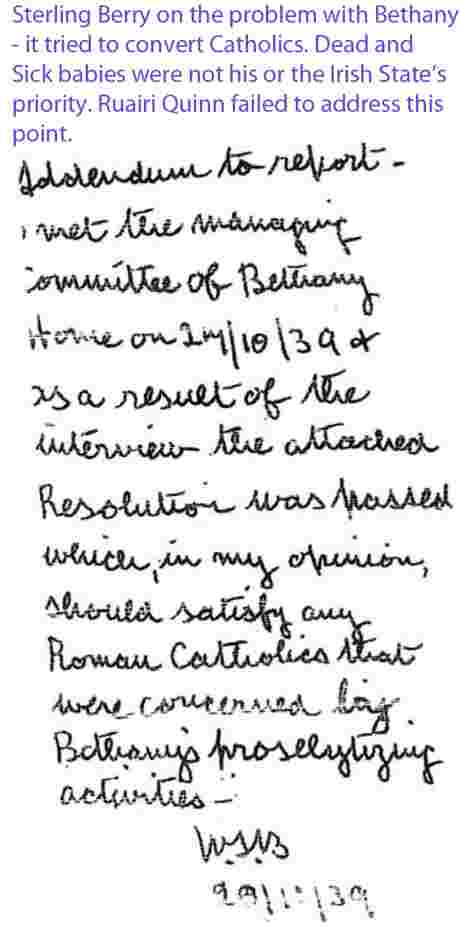|
Rights, Freedoms and Repression
Blog Feeds
Anti-Empire
The SakerIndymedia Ireland is a volunteer-run non-commercial open publishing website for local and international news, opinion & analysis, press releases and events. Its main objective is to enable the public to participate in reporting and analysis of the news and other important events and aspects of our daily lives and thereby give a voice to people.
Public InquiryInterested in maladministration. Estd. 2005
Voltaire NetworkVoltaire, international edition
|
RUAIRI QUINN wrong to deny redress to Bethany Home survivors - here is the evidence national |
rights, freedoms and repression |
feature national |
rights, freedoms and repression |
feature
 Friday June 24, 2011 17:58 Friday June 24, 2011 17:58 by Derek Leinster - Bethany Survivors Group by Derek Leinster - Bethany Survivors Group derek.linster at talktalk dot net derek.linster at talktalk dot net 42 Southey Road Rugby CV22 6HF Warwickshire 42 Southey Road Rugby CV22 6HF Warwickshire 00 44 1 788 81731 00 44 1 788 81731
 Minister for Education ignores evidence given to him at meeting
In letters to Joe Costello TD and Bethany Home Survivors Chairperson, Derek Leinster (attached), Ruairi Quinn TD, Minister for Education, turned down the survivors' request to have the Home included in the Schedule to the Residential Institutions Redress Scheme.
Related Links:
'In his reply to me and to Deputy Joe Costello, Minister Quinn ignored the arguments we put to him. Letter from Derek Leinster and Niall Meehan to Minister for Education, Ruairi Quinn Dear Minister for Education, Ruairi Quinn, Thank you for your letters of 17 June 2011 to Joe Costello and to Derek Leinster in response to points put to you by Bethany survivors, Níall Meehan and Joe Costello TD, who met you on 24 May last. Bethany Home, a Protestant evangelical institution, was, to cite the statutory basis for insertion into the Schedule to the Residential Institutions Redress Scheme, a ‘children’s home… in which children were placed and resident… in respect of which a public body had a regulatory or inspection function’. You have decided not to include Bethany Home, though it meets the stated criteria. Possibly, this is because your letter does not address the reasons put by the Bethany delegation for inclusion within the Schedule. Your letter raises issues that, while important, did not constitute the basis of the argument put to you and which, consequently, your reply has failed to address. Since 1917, according to Mary Raftery (writing in 2004), ‘Protestant children in need of care’ were ‘essentially dealt with by private institutions’. She suggested that the state’s attitude was one of ‘hands-off’. As a result, she went on, ‘It is difficult to find any State records relating to the Protestant children's homes’. Our research into Bethany Home indicates that it is precisely this policy decision not to interfere which is the reason for neglect and death in the Bethany Home and the reason why the state is culpable. There are in fact state records explaining why the state decided not to interfere when confronted with evidence of severe neglect in the Bethany Home. We supplied these records to you and you have not addressed them. We summarise them here. Record numbers of children died in Bethany between 1935-39, buried in unmarked graves in Mount Jerome cemetery. Over a third of the 219 unmarked graves discovered for the period 1922-49 originated in this period. Statutory inspection of maternity homes began in 1934 and Bethany registered in 1935. In January 1939 specific criticism of Bethany’s standards of care was reported within the Department Local Government and Public Health. In August 1939 public criticism of Bethany was raised at a meeting of the Rathdown Board of Guardians and published in the Irish Times and Independent. The Board of Guardians asked the Minister to report back to them on sick children removed from Bethany who required hospitalisation. The Deputy Chief Medical Adviser, Winslow Sterling Berry, entered Bethany once in February and twice in October 1939. The evidence shows that he engaged in a damage limitation exercise. In February he dismissed criticism from a departmental inspector who wanted a Bethany nurse mother prosecuted for severe neglect. In October, after the August meeting of the Rathdown Board of Guardians, Sterling Berry entered Bethany twice. He wrote in relation to criticism of standards of care in Bethany, ‘it is well recognised that a large number of illegitimate children are delicate’. He then went on to assert that Bethany’s problem was that it was a proselytising institution and that he proposed, as Deputy Chief Medical Adviser, to end the practice of attempting to convert Roman Catholics by banning their presence. On his third and final visit he reported being present at the special meeting he initiated, where it was agreed to cease admitting Roman Catholics. You, as Minister in this Republic in 2011, must address the Deputy Chief Medical Advisor’s use of his statutory power in this manner in 1939. It is regrettable that you have not done so in your reply. Our conclusion, which the evidence shows to be irrefutable, is that in southern Ireland’s sectarian welfare system state officials were concerned to regulate sectarianism but not welfare. Leveling the playing field in this way gave prejudiced officials an easier life. It also fatally compromised the inspection regime in Bethany. Children continued to die and to become ill in significant numbers. Nearly two thirds of the 219 unmarked graves originated in the 10 year 1935-44 period. This needless slaughter ended when Bethany was given a Maternity grant in 1949, something originally expected by Bethany’s management in 1940, after the Catholic ban. Sterling Berry’s exercise in prejudice was as illegal in 1939 as it is today. What should have happened? On one other documented occasion a senior medical adviser entered a mother and babies home. Newly appointed (in 1944) Chief Medical Adviser James Deeny visited Bessbrook, Cork, arising from reports of unusually high mortality. Just as Sterling Berry said of Bethany, Bessbrook seemed ‘clean’ and ‘well run’. However, unlike his deputy, Deeny physically examined a number of children. He found them to be suffering from a range of preventable conditions that were causing the unnecessarily high mortality. According to Deeny, ‘The deaths had been going on for years. They had done nothing about it’. He, ‘closed the place down and sacked the Matron, a nun, and also got rid of the medical officer’. Had Sterling Berry been less fixated on private denominational matters that were none of his statutory business, and more concerned with his statutory responsibility for public welfare, children’s lives might have been saved. Sterling Berry retired from the Department in 1946, while Deeny authored the 'Mother and Child legislation' that Noel Browne failed to have enacted in 1949-50. Doctors and the Church of Ireland Gazette saw it as ‘communist’ interference in the family. The Roman Catholic Church weighed in, condemned and effectively killed the legislation for similar reasons. Religiously and privately run welfare on the cheap continued. Raftery's conclusion from her analysis in 2004 bears repetition, 'The fact that the Government uses its past neglect of this section of the community to argue that it now has no responsibility to even hear their case for redress is shameful and unjust. The number of children in this category was always small. However, the abuse some of them suffered was no less real or damaging than that of their Catholic counterparts.' In relation to your point about ‘exclusion of the Bethany Home for religious grounds’, you fail to address the fact that originally in 2002, no Protestant institution was included in the Schedule to the Redress Scheme. Mary Raftery again, who also pointed out that the 2002 Redress scheme originally excluded mother and baby homes like Bethany. However, St Patrick’s, one of the State’s largest, was one of 13 institutions added in 2004. As it was Roman Catholic, she continued, ‘Consequently, the exclusion of similar Protestant institutions does indeed begin to appear worryingly sectarian’. Raftery went on: "A further Church of Ireland institution excluded is the former Smyly's Boys' Home... A number of ex-residents have alleged that they were severely abused there as children... this group feels that it has been sidelined because of its religion". As a result of this and of continuing pressure and complaints from Derek Leinster, Smiley's was then included. Also included was the Protestant run Miss Carr's home, said to have been one of the best run children's homes in the state. One puzzled former resident of Miss Carr’s home we have spoken to threw away his Redress Scheme invitation to apply for compensation. Yet Bethany Home, from which hundreds were sent to unmarked graves, was still not included. To paraphrase James Deeny, it had been going on for years and nothing was done about it. Now, today, you want to do nothing about it. Just as with the Magdalene laundry institutions, the state argues that women referred to Bethany by the courts from 1924 to 1965 (for crimes ranging from petty theft to infanticide), entered there voluntarily. Leaving that spurious argument aside, the point is that the state had a regulatory duty of care that it abandoned. It abandoned it in an institution where it was deemed acceptable to lock up women charged with infanticide and petty crime with unmarried mothers and their abandoned and then neglected offspring. The state’s washing of its hands of its responsibility is a further abandonment. That is not acceptable in this Republic. Please, in the name of decency and of justice, withdraw the letter issued in your name, possibly by a misguided civil servant, and get to the heart of this matter. Bethany survivors deserve redress. We would like you to address the points made here that are central to the case for including Bethany Home in a scheme of redress.
|




























 printable version
printable version

 Digg this
Digg this del.icio.us
del.icio.us Furl
Furl Reddit
Reddit Technorati
Technorati Facebook
Facebook Gab
Gab Twitter
Twitter
View Full Comment Text
save preference
Comments (5 of 5)